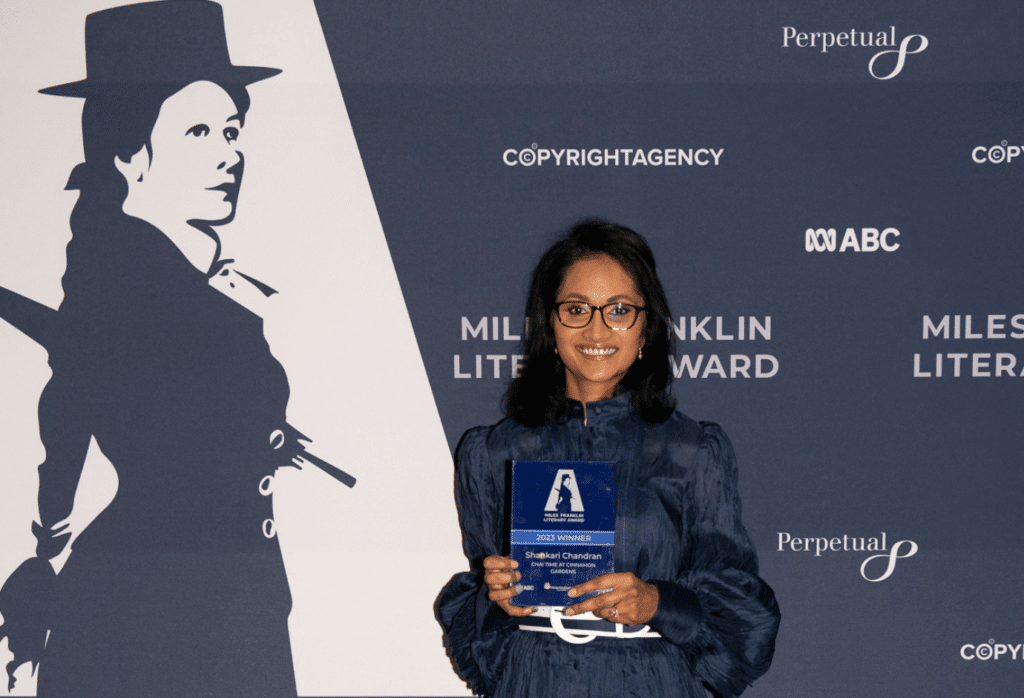When I chat to this year’s Miles Franklin Award winner Shankari Chandran on Wednesday afternoon – less than 24 hours after she was named the recipient of the prestigious award, she tells me that she’s just been informed by her publisher of some other good news. Her winning book — “Chai Time at Cinnamon Gardens” has just reached No. 1 on Amazon. So — how does it feel?
“It is incredible. I was resigned to my books really early being bought by my friends and extended family. I’m still quite shocked and over the moon,” Chandran tells me.
The humble mother of four said she is still processing the win. “I am extremely happy and so grateful for the incredible outpouring of love and warmth for the novel. I’m very, very excited.”
Much has been written about Chandran since her win was announced on Tuesday night. What I wanted to learn from the author was how she made it work — juggling parenting four teenage children while working four-days a week in sustainability for a retailer — and writing books.
“I have a strict routine,” she said. “Absolutely, I just can’t do it any other way.”
Chandran works Monday to Thursday at her sustainability job, and then on Fridays, she “goes hard…and sits down and smashes it out.”
On Thursday night, she organises herself so that her Friday is relatively clear and all she has to do is work on her novels.
“There’s a lot of domestic work done on a Thursday night and a lot of passionate organisation,” she said. “If I set myself up well on Thursday, then I give myself a really good Friday.”
Two mornings a week, Chandran wakes at 6am and undertakes “sprint” writing sessions: “I set myself a very easy goal. I just say to myself, I’ve just got to write for 20 minutes. That’s all it is. I just go and don’t look back.”
“The best piece of writing advice that my writing teacher ever gave me was just write it down. I just write as hard as I can and I don’t look at what I’ve written until I have finished a manuscript, so I won’t even reread a scene.”
Chandran says these sprint sessions prepare her for her writing day on Fridays.
“If I’m going in cold on Friday morning, it is much harder to write on that Friday. So I’m trying to help myself… I try to do things that I know will help me, and set me up for success on that Friday.”
Chandran is part of the cohort of writers who plot their novels — she says she tends to know the broad plot of her stories before she writes them.
“I’ll know where I want to start because there will be a strong scene or image in my mind, the kickoff for the manuscript. I know what the big problem is that needs to be solved. And then I have a sense of how that will be resolved. I know the beginning, the middle and the end, not in great detail. And then as I write other things happen that are completely unexpected to me and are exciting and you go with it.”
“The amazing thing about writing is that once you start it just takes you on its own journey and it has its own energy. And you’re often there along for the ride and it’ll go to places that are very surprising to me.”
Chandran has been open about the challenges she has faced trying to get her novels published in Australia — after the publication of her second novel, “The Barrier”, publishers refused to take on her next novel. Her first novel was rejected — for not being “Australian” enough.
“It’s incredibly soul destroying because you put yourself out there in a way that I don’t put myself out there when I’m a lawyer,” she said. “I have made myself vulnerable and opened myself up through my writing, and that is frightening.”
Yet her love of writing conquered her fears, and she continued to write. “I love writing so much. I really did genuinely think to myself with this novel, it’s not going to get published and I need to be okay with that, and then you start anyway. And I pushed that novel to be of the highest standard.”
As a woman writer, and as a woman of colour, Chandran knows the importance of carving out space for yourself — and how difficult that can be. For her, the secret lies in giving herself permission to write whenever she wants.
“I should give myself permission to write — Miles Franklin award or no publishing contracts or not, I should give myself permission to write — I would say to myself, to just keep writing no matter what people say or do or don’t say.”
Recently, a friend from Chandran’s bookclub pushed a book by Kerri Sackville onto her. Reading the book, Chandran reiterated the importance for women to give themselves permission not to do all the things that are expected of them as women.
“If I was to begin my writing after I’d done everything in the morning, that is expected of me, I only get to my writing at about 11:30am instead of at 6:30am,” she explained. “I’d have lost five hours on domestic tasks that will be there tomorrow. And so what I would say to women, and women who are writing, is to put yourself first and go for it.”


